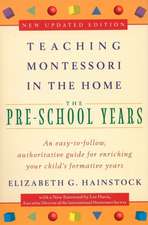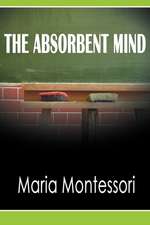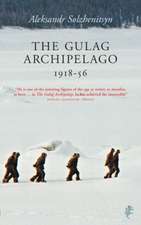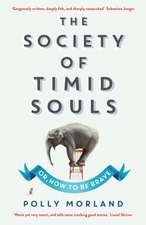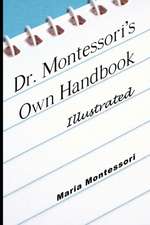The Montessori Method
Editat de Maria Montessorien Limba Engleză Paperback – 30 oct 2013
Following opening statements from J. McV. Hunt and Jaan Valsiner, Maria Montessori discusses topics including pedagogical methods used in the children's houses, discipline, diet, gymnastics, manual labor, education of the senses, intellectual education, methods of teaching reading and writing, language in childhood, and teaching of numeration.
This classic volume in the education of children takes on urgent relevance for parents, teachers, and administrators in all parts of our society. The suburban mother seeking an environment of "structured freedom" for an imaginative, quick-learning pre-schooler; the educator jolted into awareness that slum children are irreparably handicapped by cultural impoverishment before the age of six; explorers of "new" techniques of teaching reading, of programmed instruction and learning by conditioning and reinforcement-by-approval—all these are instructed by Maria Montessori's theory and the reports of her work in the Casa dei Bambini in the slum quarter of Rome.
Preț: 435.10 lei
Nou
Puncte Express: 653
Preț estimativ în valută:
83.31€ • 86.75$ • 69.12£
83.31€ • 86.75$ • 69.12£
Carte tipărită la comandă
Livrare economică 14-28 februarie
Preluare comenzi: 021 569.72.76
Specificații
ISBN-13: 9781412852821
ISBN-10: 141285282X
Pagini: 426
Dimensiuni: 138 x 216 x 23 mm
Greutate: 0.45 kg
Ediția:1
Editura: Taylor & Francis
Colecția Routledge
Locul publicării:Oxford, United Kingdom
ISBN-10: 141285282X
Pagini: 426
Dimensiuni: 138 x 216 x 23 mm
Greutate: 0.45 kg
Ediția:1
Editura: Taylor & Francis
Colecția Routledge
Locul publicării:Oxford, United Kingdom
Cuprins
INTRODUCTION TO THE TRANSACTION EDITION, INTRODUCTION. CHAPTER I A CRITICAL CONSIDERATION OF THE NEW PEDAGOGY IN ITS RELATION TO MODERN SCIENCE, CHAPTER II HISTORY OF METHODS, CHAPTER III INAUGURAL ADDRESS DELIVERED ON THE OCCASION OF THE OPENING OF ONE OF THE CHILDREN'S HOUSES, CHAPTER IV PEDAGOGICAL METHODS USED IN THE CHILDREN'S HOUSES, CHAPTER V DISCIPLINE, CHAPTER VI HOW THE LESSON SHOULD BE GIVEN, CHAPTER VII EXERCISES OF PRACTICAL LIFE, CHAPTER VIII REFECTION—THE CHILD'S DIET, CHAPTER IX MUSCULAR EDUCATION—GYMNASTICS, CHAPTER X NATURE IN EDUCATION—AGRICULTURAL LABOUR: CULTURE OF PLANTS AND ANIMALS, CHAPTER XI MANUAL LABOUR—THE POTTER'S ART, AND BUILDING, CHAPTER XII EDUCATION OF THE SENSES, CHAPTER XIII EDUCATION OF THE SENSES AND ILLUSTRATIONS OF THE DIDACTIC MATERIAL: GENERAL SENSIBILITY: THE TACTILE, THERMIC, BARIC AND STEREOGNOSTIC SENSES, CHAPTER XIV GENERAL NOTES ON THE EDUCATION OF THE SENSES, CHAPTER XV INTELLECTUAL EDUCATION, CHAPTER XVI METHOD FOR THE TEACHING OF READING AND WRITING, CHAPTER XVII DESCRIPTION OF THE METHOD AND DIDACTIC MATERIAL USED, CHAPTER XVIII LANGUAGE IN CHILDHOOD, CHAPTER XIX TEACHING OF NUMERATION: INTRODUCTION TO ARITHMETIC, CHAPTER XX SEQUENCE OF EXERCISES, CHAPTER XXI GENERAL REVIEW OF DISCIPLINE, CHAPTER XXII CONCLUSIONS AND IMPRESSIONS
Descriere
Maria Montessori's method of educating children, which she details in this book, is based on a conception of liberty for the pupil; it entails formal training of separate sensory, motor, and mental capacities; and leads to rapid and substantial mastery of the elements of reading, writing, and arithmetic
Notă biografică
Maria Montessori (1870-1952) was an Italian educator and physician. Born in Chiaravalle, she came from a prominent, well-educated family of scientists and government officials. Raised in Florence and Rome, Montessori excelled in school from a young age, graduating from technical school in 1886. In 1890, she completed her degree in physics and mathematics, yet decided to pursue medicine rather than a career in engineering. At the University of Rome, she overcame prejudice from the predominately male faculty and student body, winning academic prizes and focusing her studies on pediatric medicine and psychiatry. She graduated in 1896 as a doctor in medicine and began working with mentally disabled children, for whom she also became a prominent public advocate. In 1901, she left her private practice to reenroll at the University of Rome for a degree in philosophy, dedicating herself to the study of scientific pedagogy and lecturing on the topic from 1904 to 1908. In 1906, she opened her Casa dei Bambini, a school for children from low-income families. As word of her endeavor spread, schools using the Montessori educational method began opening around the world. In the United States, the publication of The Montessori Method (1912) in English and her 1913 lecture tour fostered a rapid increase of Montessori schools in the country. For her groundbreaking status as one of Italy¿s first female public intellectuals and her role in developing a more individualized, psychologically informed approach to education, Maria Montessori continues to be recognized as one of the twentieth century¿s most influential figures.






